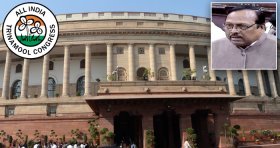December 28, 2017
Sukhendu Sekhar Roy speaks on The Repealing and Amending Bill, 2017

FULL TRANSCRIPT
Sir, I rise to support the Bills, which have been taken together for discussion. The question arises that, what prompted the government to go for repealing of so many Acts at a time? To my mind, the reply is that most of the Acts, which have been listed in the Bill have either gone obsolete or redundant because of newer Acts which have come into being or the different rulings of the Supreme Court or the international covenants ratified by India. Possibly these are the reasons for which the government has come out with the Repealing and Amendment Bills.
Sir, there are many Acts listed for repealing which date back to pre-independent era, as rightly pointed out by some of my honourable colleagues, such as the Public Servant’s Enquiries Act of 1850, the Sheriff Fees Act of 1852, the Converse Marriage Resolution Act of 1866 etc. Now, Sir, these Acts ought to have been repealed much earlier than today. But unfortunately it escaped the attention or notice of successive governments at the Centre. That is why I support these Bills which have been taken together.
Sir, Article 372 (Clause 1) of the Constitution says, that pre-independent laws continue to remain in force unless amended or repealed by a competent legislature. Now, which is a competent legislation with regard to certain Acts which have been listed on List 1, List 2 and List 3? Based on the reading of the Article 372 (Clause 1), the Law Commission of India in its 248th report, published in September 2014 said and I quote: “If the subject matter of a pre-constitutional law falls into the State List, the state government is competent legislature to repeal that Act.”
I sincerely hope that the government has followed this recommendation of the Law Commission which is otherwise a legal requirement. Sir, the Law Commission also recommended that the Appropriation Acts that are older than 10 years should also be rebuilt. In the recent past we have rebuilt so many Appropriation Acts. We should follow the Australian formula. What happens in Australia ? The Australian Legislation Act of 2001 mended from automatic repeal of Appropriation Acts on the last day of a particular financial year.
Sir, if we adopt that Australian model then there shall be no need to bring out the long list of Appropriation Bills for rebuilding . I would like to ask the government, through you Sir, that on the expiry of the last day of the financial year the Appropriation Bill should automatically be rebuilt for which the government should make a separate legislation. All the time we play the role constructive opposition. Sir, I sincerely believe while introducing the Bills the government has not taken care of the provisions of Section 6A of the General Clauses Act, 1897. A situation may arise where many litigations will unnecessarily come and the government will have to face that.
Sir, it must be made clear that the government does not end with repeals and amendments. The bigger idea behind this Bill should be dedicated to reform the idea of India. As lawmakers we should to move from inactive legislation now and then which are counterproductive to the well being of the citizens. Only when the necessity arises, then only we should go for legislation. To appease one section or any other section of the society the government must not make any law. Otherwise, we have to face similar situation for repealing and amending the Acts and it will be a continuous process.
With these words I support this Bill. Thank You.
